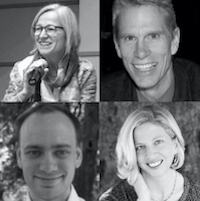Rationality, Ritual, and Democratic Decision-Making: Perspectives from Classical Athens
Sara Forsdyke (University of Michigan) and Josiah Ober (Stanford University), Moderated by Emily Mackil (UC Berkeley, Department of History and Chair, Graduate Group in Ancient History and Mediterranean Archeology) and Duncan MacRae (UC Berkeley Department of Classics)
As the November 2020 General Election approaches, the nature of democratic decision-making is a question of vital importance for participants in American democracy. How do communities make collective decisions? Do democratic institutions encourage more rational choices? Or irrational ones? How do religious ideas and practices shape the patterns and outcomes of community decision-making?
Classical Athens has often been exemplary for thinking through big questions of democratic theory and practice. In a panel discussion on Friday October 16, 10:00AM PST, Sara Forsdyke and Josiah Ober (Stanford University) will take up these questions in relation to both Classical Athens and more contemporary societies. Emily Mackil, (UC Berkeley Department of History and Chair, Graduate Group in Ancient History and Mediterranean Archeology) and Duncan MacRae (UC Berkeley Department of Classics) will serve as interlocutors. With the history and institutions of classical Athens at the center of the conversation, the panel will range across fundamental issues of democratic practice and theory, touching on political institutions, rationality, political and religious ritual, and, ultimately, the significance of democratic political participation.
Sara Forsdyke (Josiah Ober Collegiate Professor of Ancient History at the University of Michigan) is an historian of ancient Greece who writes about democracy, slavery and the law, both ancient and modern. Much of her work begins from the proposition that the ancient Greek past can serve as a valuable resource for examining the issues of today, including how to strengthen our democracy, how recognize and reduce patterns of discrimination and inequality, and how to reform our criminal justice system.
Josiah Ober (Mitsotakis Professor in the School of Humanities and Science at Stanford University) is an ancient historian and political theorist. He works on historical institutionalism and political theory, focusing on the political thought and practice of the ancient Greek world and its contemporary relevance. Professor Ober was the Sather Professor at Berkeley in Fall 2019.
Emily Mackil (UC Berkeley Department of History and Chair, Graduate Group in Ancient History and Mediterranean Archeology) is a historian of the ancient Greek world who has written extensively about the development and nature of Greek federal states; the entanglement of religious practice and political power; the economic history of the Greek world; and most recently about property ownership.
Duncan MacRae (UC Berkeley Department of Classics) studies Roman history from the period of the late Republic to Late Antiquity, particularly the entangled histories of religion and intellectual life. He is particularly preoccupied by questions of religious change, the relationship between ideas and social institutions, and the sociology of knowledge. These interests have led him to also write on the history of Judaism in antiquity and the history of ideas in early modernity.
Download the event announcement here.
 As part of the Berkeley Democracy and Public Theology Program BCSR’s Public Forum on Religion and Pandemic brings together scholars and the public to address the current pandemic and its commensurate crises, exploring the intersection between religion and timely topics such as the environment, public health, elections and democracy, religious freedom, and nationalism in order to foster dialogue and reflection.
As part of the Berkeley Democracy and Public Theology Program BCSR’s Public Forum on Religion and Pandemic brings together scholars and the public to address the current pandemic and its commensurate crises, exploring the intersection between religion and timely topics such as the environment, public health, elections and democracy, religious freedom, and nationalism in order to foster dialogue and reflection.
Presented by the Berkeley Center for the Study of Religion with generous support from the Henry Luce Foundation and the Doreen B. Townsend Center for the Humanities, and co-sponsored by the Center for Democracy, Toleration, and Religion (CDTR), and the Social Science Matrix.

